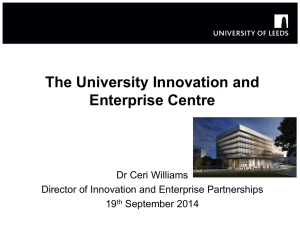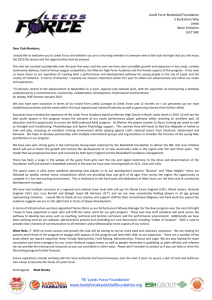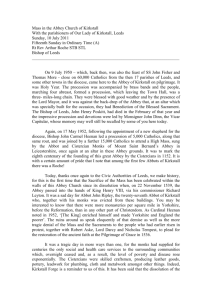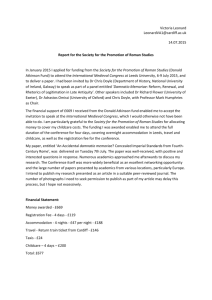Information and Application Pack
advertisement
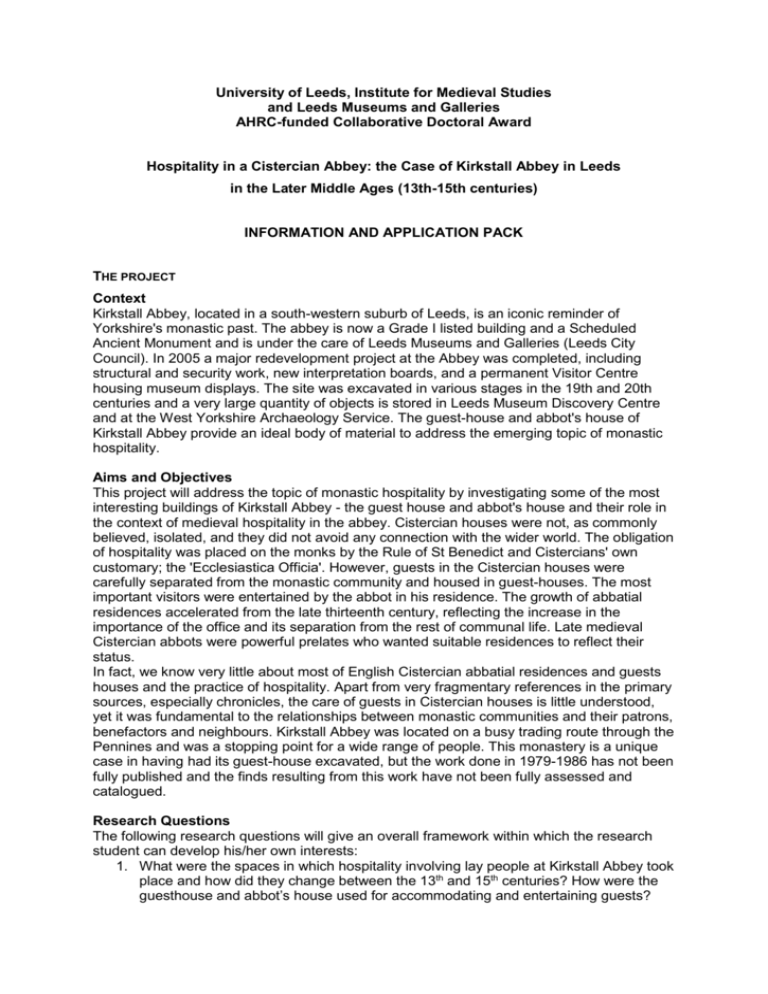
University of Leeds, Institute for Medieval Studies and Leeds Museums and Galleries AHRC-funded Collaborative Doctoral Award Hospitality in a Cistercian Abbey: the Case of Kirkstall Abbey in Leeds in the Later Middle Ages (13th-15th centuries) INFORMATION AND APPLICATION PACK THE PROJECT Context Kirkstall Abbey, located in a south-western suburb of Leeds, is an iconic reminder of Yorkshire's monastic past. The abbey is now a Grade I listed building and a Scheduled Ancient Monument and is under the care of Leeds Museums and Galleries (Leeds City Council). In 2005 a major redevelopment project at the Abbey was completed, including structural and security work, new interpretation boards, and a permanent Visitor Centre housing museum displays. The site was excavated in various stages in the 19th and 20th centuries and a very large quantity of objects is stored in Leeds Museum Discovery Centre and at the West Yorkshire Archaeology Service. The guest-house and abbot's house of Kirkstall Abbey provide an ideal body of material to address the emerging topic of monastic hospitality. Aims and Objectives This project will address the topic of monastic hospitality by investigating some of the most interesting buildings of Kirkstall Abbey - the guest house and abbot's house and their role in the context of medieval hospitality in the abbey. Cistercian houses were not, as commonly believed, isolated, and they did not avoid any connection with the wider world. The obligation of hospitality was placed on the monks by the Rule of St Benedict and Cistercians' own customary; the 'Ecclesiastica Officia'. However, guests in the Cistercian houses were carefully separated from the monastic community and housed in guest-houses. The most important visitors were entertained by the abbot in his residence. The growth of abbatial residences accelerated from the late thirteenth century, reflecting the increase in the importance of the office and its separation from the rest of communal life. Late medieval Cistercian abbots were powerful prelates who wanted suitable residences to reflect their status. In fact, we know very little about most of English Cistercian abbatial residences and guests houses and the practice of hospitality. Apart from very fragmentary references in the primary sources, especially chronicles, the care of guests in Cistercian houses is little understood, yet it was fundamental to the relationships between monastic communities and their patrons, benefactors and neighbours. Kirkstall Abbey was located on a busy trading route through the Pennines and was a stopping point for a wide range of people. This monastery is a unique case in having had its guest-house excavated, but the work done in 1979-1986 has not been fully published and the finds resulting from this work have not been fully assessed and catalogued. Research Questions The following research questions will give an overall framework within which the research student can develop his/her own interests: 1. What were the spaces in which hospitality involving lay people at Kirkstall Abbey took place and how did they change between the 13th and 15th centuries? How were the guesthouse and abbot’s house used for accommodating and entertaining guests? 2. Who were the guests in the abbey? Were did they come from and what were the reasons for their stay at Kirkstall? How did they spend time in the abbey and what were their interactions with the abbot and the community? 3. How does the evidence for hospitality at Kirkstall Abbey fit with the Cistercian model of hosting guests and with written and architectural/archaeological evidence from other Yorkshire houses (especially Kirkstall’s mother house, Fountains Abbey)? 4. What was the role of hospitality for Kirkstall in maintaining positive relationships with the wider world – patrons, benefactors, business partners, other Cistercian abbots and prelates from Yorkshire? This project will make an important contribution to our understanding of the Cistercian relationship with the wider world, and hospitality in a monastic context. For Kirkstall Abbey it will provide new interpretative boards on the site of the guest-house and abbot's residence as well as new a section to the on-site exhibition using and cataloguing so far uncatalogued finds. The cataloguing of the finds will be an important aspect of the project and its results will be accessible through the Leeds City Museum website. TRAINING AND SUPERVISION The student will be based in the Institute for Medieval Studies, and will also spend a considerable amount of time working at the Leeds Museum and Galleries sites. The cosupervisors will be Dr Emilia Jamroziak of the University of Leeds and Ms Katherine Baxter, Curator of Archaeology for Leeds Museums and Galleries. Training provided at the University of Leeds: Latin, research methods, and a modern foreign language (if appropriate) during the first year of research, as part of the Institute for Medieval Studies PhD programme. Through the training offered by Leeds Museums and Galleries the student will develop skills specific to museum and curatorial work, including object handling, collections management, and interpretations of archaeological finds. The student will also receive training in the communication of academic scholarship to a non-specialist audience. With the support of Ms Baxter and her LMG colleagues, the student will develop a detailed curatorial knowledge of the collection and will contribute to Kirkstall site interpretation and the production of written materials, and will be trained to assist at museum workshops and specialist study days. RESOURCES FOR STUDY The University of Leeds library has excellent holdings in materials related to monastic history. An additional collection of published and manuscript resources on medieval Yorkshire history can be consulted in the library of Yorkshire Archaeological Society adjoin to the campus. The finds from the guesthouse excavations are only partially catalogued and are stored in the Leeds Museum Discovery Centre and the West Yorkshire Archaeological Services site. This collection comprises some 6,000 items of pottery, metal-work, glass, architectural fragments and different types of organic matter. In the IMS, the student will be working alongside PhD candidates researching a range of medieval topics and will be a part of thriving community of medievalists across the University. Research degree structure The student will be based in the Institute for Medieval Studies, University of Leeds. The PhD project will be structured like all interdisciplinary research degrees in the IMS so that, as well as embarking on their doctoral project, in the first year of study the student follows the following taught modules in important skills for research: • Research Methods and Bibliography, • Medieval Latin, • A modern foreign language relevant to published secondary scholarship on the subject of the research. These are the only elements which will be examined, apart from the thesis. The requirement to take one or more of these modules may be waived if a student has already undertaken a similar module in an earlier course of study. Supervision sessions, with both co-supervisors in attendance, will take place in the University of Leeds and the Leeds City Museums and Galleries sites. In the first year of research the student will work with the co-supervisors and also with an advising tutor from the IMS whose research specialism relates to the project and complements those of the supervisors. The supervisors and the advising tutor will work with the student in the first year to shape the project and give bibliographical and methodological guidance. In the following years, the student will continue with their research under the guidance of the supervisors. The student will present an annual paper on their work in progress at a research seminar in the IMS. IMS research students are also encouraged to give papers at national and international conferences, including at the International Medieval Congress (www.leeds.ac.uk/ims/imc/imc.htm). Details of the taught modules listed above, and of other aspects of PhD study in the IMS, can be found on the website www.leeds.ac.uk/ims HOW TO APPLY Entry requirements and eligibility The studentship is tenable for up to 3 years (full-time) or up to 5 years (part-time) from 1 October 2011. Renewal of the studentship each year is subject to satisfactory academic progress. AHRC regulations require that applicants must meet UK residency criteria or be ordinarily resident in the EU. EU candidates are normally eligible for a fees-only award, unless they have been ordinarily resident in the UK for 3 years immediately preceding the date of the award. Applicants should normally have, or expect soon to be awarded, a Masters degree in a relevant discipline: either in Medieval Studies, or single discipline such as History, Archaeology, Art History or Museum Studies which has a strong medieval component. Further details concerning eligibility are available via the AHRC website at http://www.ahrc.ac.uk/FundingOpportunities/Documents/GuidetoStudentFunding.pdf. Full awards cover academic fees at the standard UK rate and a maintenance grant for fulltime study (the maintenance grant for part-time study will be pro-rata) together with other allowances if appropriate. In the 2011/2012 academic year full-time awards provide a maintenance grant payment of £13,590 p.a. and fees of £3,732 p.a. In addition to these amount, the AHRC will pay an additional £500 p.a. in April to students in receipt of a full award. The student will also receive a contribution each year from Leeds Museums & Galleries towards research expenses. English language requirements The University of Leeds, Institute for Medieval Studies, has the following minimum English language requirements for research postgraduate applicants whose first language is not English: Pearson Academic Test: Minimum PTE Academic score of 64 with at least 60 in each of the skills. IELTS: Overall score of at least 6.5, with no grade below 6.0. TOEFL: Paper-based overall score of at least 580 with 4.5 on the Test of Written English (TWE); computer-based overall score of at least 240 with 4.5 on essay writing; Internetbased overall score of at least 94 with a minimum score of 20 in listening, 23 in reading, 23 in speaking and 24 in writing. Application process The closing date for applications is Wednesday 15 June 2011 You should also arrange for three academic references to be sent to us by this date. Interviews are expected to take place in the week commencing 20 June 2011. All of the items listed below should be sent directly to the IMS, at the following address: Institute for Medieval Studies, Parkinson Building room 405, University of Leeds, Leeds LS2 9JT, UK. (a) (b) (c) (d) (e) (f) (g) The University of Leeds online Research Degree application - please state under Sponsor details AHRC Collaborative PhD studentship (Kirkstall Abbey); Three references from the three nominated referees (please arrange for these to be sent by the referees directly to the IMS at the above address, in time for the deadline); A complete undergraduate (and, where appropriate, MA) academic record or transcript, providing grades; English language certificate if appropriate (see above). IMS Application for Admission form; One item of written work (max. 3000 words), such as an undergraduate or MA assessed essay, on a medieval topic; In place of the PhD research proposal in section G, please write 500 words detailing how you would approach the collaborative project, considering the following points: 1) how your previous experience would equip you to undertake the proposed research; 2) how you would formulate the project within the parameters laid down by the further particulars (see above), particularly emphasizing any areas where you think it could usefully be developed; 3) how you envisage the collaborative nature of the project being of benefit to your study; and 4) how you consider the proposed research would further your future plans. For further information and informal discussion about the application process and the scholarship, please contact Ms Alison Martin in the IMS, on medieval-studies@leeds.ac.uk, tel. 0113 343 3620. For further information and informal discussion about the project, please contact Dr Emilia Jamroziak on e.m.jamroziak@leeds.ac.uk, tel. 0113 3433592.


